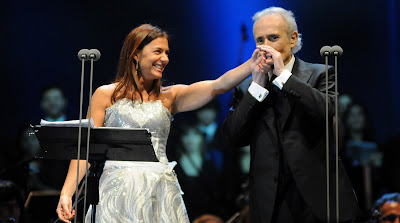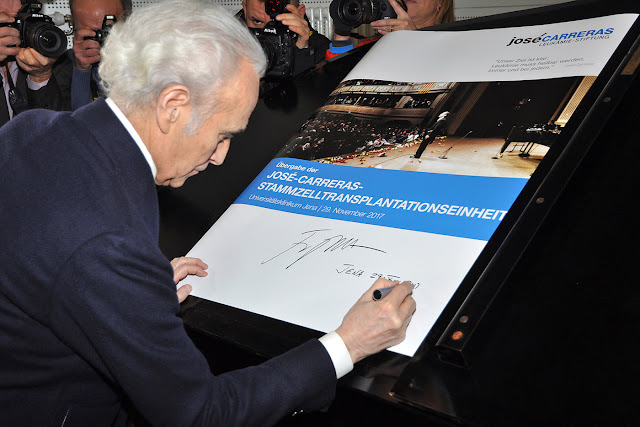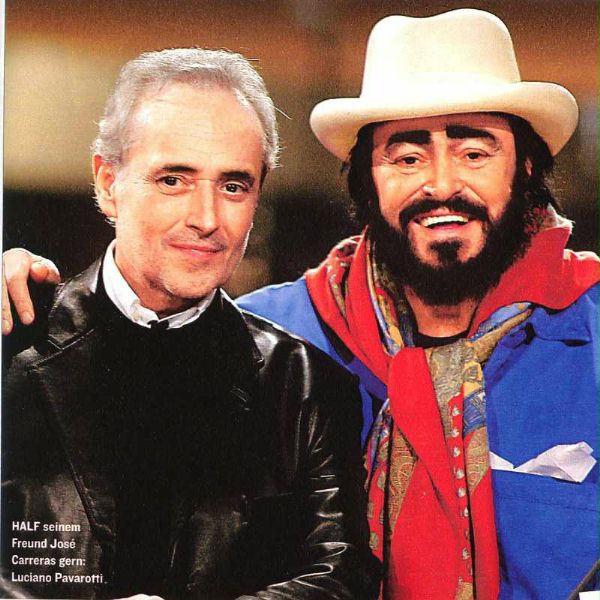Josep Carreras regaló a Mendoza un momento histórico para recordar
La grande notte di Mendoza non ha deluso le aspettative: Josep Carreras e Verónica Cangemi hanno offerto alla città natale del soprano il suo grande momento storico attraverso un concerto all'aperto e gratuito presso il Centro Culturale Julio Le Parc di Guaymallén. Insieme a loro, il cherenguista Jaime Torres, David Giménez alle redini dell'Orchestra Filarmonica di Mendoza, il Coro Universitario e il Coro de Cámara de la UNCuyo, José Luis Castiñeira de Dios e il Grupo Anacrusa. Una moltitudine di ben 12.000 persone non ha voluto rinunciare ad assistere al grande evento celebratosi del giorno di Santa Cecilia, patrona della musica.
PRESS AND PHOTOS
Il programma previsto, è risultato complessivamente fuori dall'usuale: i primi applausi sono arrivati con la presentazone della Filarmonica di Mendoza e del Grupo Anacrusa, diretti da David Giménez, sancita dall'esecuzione dell'intermezzo de El Baile de Luis Alonso di Gerónimo Giménez, primo momento di un percorso che ha per oggetto la Zarzuela, che ha subito dopo contato sull'intervento dei due cantanti. Josep Carreras, per prima volta davanti al pubblico di Mendoza, è stato accolto molto calorosamente e ha inaugurato la serata con un brano di Francisco Alonso, ovvero la Canción del Gitano dalla zarzuela La Linda Tapada, e con un classico come En Aranjuez con tu amor, brano tratto dal Concerto de Aranjuez di Joaquín Rodrigo, del quale è ben nota la versione cantata dallo stesso Carreras.
Verónica Cangemi, padrona di casa, ha allietato il suo pubblico con un altro rappresentante del genere della zarzuela come Francisco Barbieri, nello specifico con la Canción de Paloma da El barberillo de Lavapiés.
Prima di un nuovo intermezzo firmato da Gerónimo Giménez, questa volta della più celebre La Boda de Luis Alonso, il tenore si è cimentato con un altro suo punto forte come Ya mis horas felices tratto da La del Soto del Parral, per poi unirsi al soprano per il Dúo y Jota da El dúo de la Africana di Manuel Caballero, un momento sempre di grande intensità, in quanto comporta un'interpretazione che abbraccia l'arte del cantante a quella dell'attore, qualcosa che trova in Carreras sempre un risultato eccellente.
Prima di un nuovo intermezzo firmato da Gerónimo Giménez, questa volta della più celebre La Boda de Luis Alonso, il tenore si è cimentato con un altro suo punto forte come Ya mis horas felices tratto da La del Soto del Parral, per poi unirsi al soprano per il Dúo y Jota da El dúo de la Africana di Manuel Caballero, un momento sempre di grande intensità, in quanto comporta un'interpretazione che abbraccia l'arte del cantante a quella dell'attore, qualcosa che trova in Carreras sempre un risultato eccellente.
Un brano a testa prima di concludere ufficialmente la prima parte del concerto: Me llaman la primorosa per Verónica Cangemi, tratto dalla zarzuela El Barbero de Sevilla, e The Impossible Dream per Josep Carreras, brano tratto dal musical The Man of La Mancha di Mitch Leigh.
Photo by: MDZ
Dopo l'intervallo, la seconda parte è stata aperta da due classici d'eccezione: il Va Pensiero dal Nabucco di Verdi, eseguito dalle due corali, e l'Ave Maria di Mascagni interpretata da Verónica Cangemi. In seguito, l'annunciatissima Misa Criolla di Ariel Ramírez. Momentaneamente si dispone di un unico video che mostra un frammento del Credo, terzo brano in successione di quest'opera di grande intensità mistica e folk, interpretato sia da Carreras sia dal soprano. Inizialmente si diceva che alla Cangemi fossero stati assegnati la Gloria e il Sanctus, mentre il resto a Carreras. A questo punto non so se solo il Credo sia stato interpretato in forma di duetto, Kyrie e Agnus Dei affidati al tenore, Gloria e Sanctus al soprano o diversamente. Speriamo che qualcuno chiarisca questi dubbi, e che venga condiviso più materiale video.
La stampa non fa riferimento al numero preciso di encores che sono stati concessi in conclusione: vengono però citati Besame Mucho cantato da Verónica Cangemi, l'immancabile El día que me quieras di Carlos Gardel, del quale Carreras offre sempre un'interpretazione squisita, e una versione in duetto di Solamente una vez. Potrei ipotizzare altro, ma la peculiarità del repertorio studiato appositamente per l'occasione mi trattiene.
Quello che conta è che sia stato un successo straordinario, e che Carreras abbia donato alla città di Mendoza una serata memorabile che è ufficialmente entrata nella storia.
Key facts:
◦ The great event has not disappointed the expectation of people from Mendoza: Josep Carreras and Verónica Cangemi offered the the soprano's hometown his great historical moment through a free open air concert at the Julio Le Parc Cultural Center in Guaymallén. Together with them, the cherengue player Jaime Torres, David Giménez conducting the Mendoza Philharmonic Orchestra, the University Choir and UNCuyo Camara Choir, José Luis Castiñeira de Dios, and Grupo Anacrusa. A crowd of 12,000 people did not want to give up to attend the big event celebrated on St. Cecilia's day, patroness of music.
The expected program was indeed out of the ordinary: the first applause came with introduction of Mendoza Philharmonic and Grupo Anacrusa, conducted by David Giménez, marked by the execution of the intermezzo from El Baile de Luis Alonso by Gerónimo Giménez, the first moment of process focused on Zarzuela, which immediately after has counted on the contribution of the two singers. Josep Carreras, for the first time in front of Mendoza audience, was greeted very warmly and officially opened the concert with a song by Francisco Alonso, Canción del Gitano from La Linda Tapada, and with a classic like En Aranjuez con tu amor, a song taken from Concerto de Aranjuez by Joaquín Rodrigo, whose version sung by Carreras is well known.
Verónica Cangemi, native of Mendoza, has delighted her audience with a song by another representative composer of the genre of zarzuela as Francisco Barbieri, specifically with Canción de Paloma by El barberillo de Lavapiés. Before of a new interlude signed by Gerónimo Giménez, this time the most famous La Boda de Luis Alonso, the tenor has performed another strong point of his as Ya mis horas felices, taken from La del Soto del Parral, then joined the soprano for Dúo y Jota from El dúo de la Africana by Manuel Caballero, always a moment of great intensity, as it implies an interpretation that combines the singer's to the actor's art, something that always finds in Carreras an excellent result.
One piece each, before officially closing the first part of the concert: Me llaman the primorosa for Verónica Cangemi, taken from the zarzuela El Barbero de Sevilla, and The Impossible Dream by Josep Carreras, a song from the musical titled The Man of La Mancha by Mitch Leigh .
◦ After the break, the second part was opened by two classics of exception: Va Pensiero from Nabucco by Verdi, performed by both choirs, and Mascagni's Ave Maria sung by Verónica Cangemi. Subsequently, the specially announced Misa Criolla by Ariel Ramírez. At the moment we have a single video showing a fragment of the Credo, the third song in succession of this very intense and mystical folk mass, sung by both Carreras and the soprano. Initially it was said that the Cangemi should sing Gloria and Sanctus, while and the rest was destined to Carreras. At this point, I do not know if only Credo was interpreted in the duet form, Kyrie and Agnus Dei assigned to our tenor, and Gloria and Sanctus to the soprano or otherwise. I hope someone will clarify these doubts, and more video material to be shared.
◦ The press does not refer to the precise number of encores offered at the end: however, they mention Besame Mucho sung by Verónica Cangemi, the inevitable El día que me quieras of Carlos Gardel, which Carreras always offers an exquisite interpretation, and a duet version of Solamente una vez. I could guess some more, but the peculiarity of the repertoire specially designed for the occasion prevents me from doing it.
What really matters is that it was a tremendous success, and that Carreras has donated to the city of Mendoza a memorable evening that is now officially part of history.




Comments
Post a Comment
Recent comments